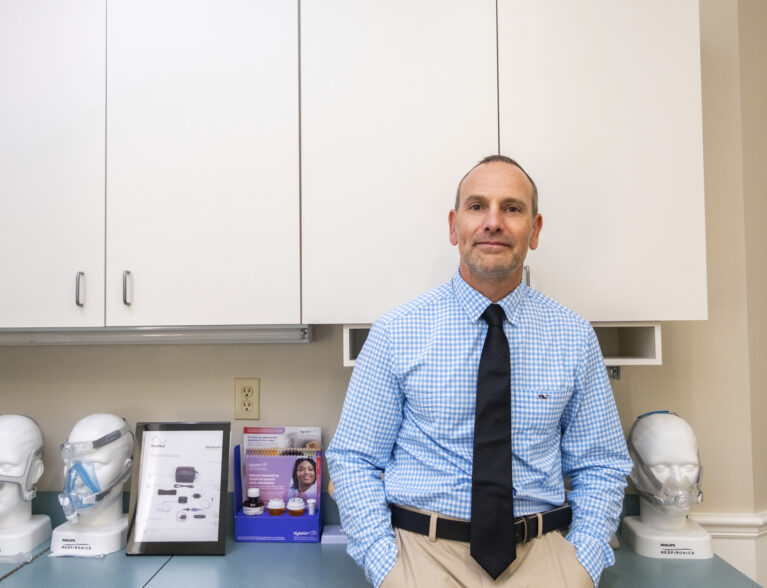
It is well known that poor sleep can take a toll on daily performance and mental health, but recent studies show that it can also contribute to weight gain and worsen complications from obstructive sleep apnea (OSA). Losing weight is already challenging, and the fatigue caused by OSA only makes it harder. Fortunately, new insights offer hope for breaking the vicious cycle of sleep deprivation, weight gain and worsening health.
In December 2024, the U.S. Food and Drug Administration (FDA) approved the weight loss drug Zepbound, a brand of Tirzepatide, for the treatment of moderate to severe obstructive sleep apnea in adults with obesity, to be used in combination with a reduced calorie diet and increased physical activity.
Zepbound tackles an underlying cause of excess weight and reduces appetite and how much you eat.
“This is the first drug treatment option for certain patients with obstructive sleep apnea,” said Dr. Philip Nye, an anesthesiologist and sleep specialist at Neurologic Health and Restorative Sleep. “There’s a direct correlation between sleep and BMI. A 13-year study reported every extra hour of increased sleep duration was associated with a reduction in the risk of obesity.
“The tendency for weight gain after sleep loss or sleep deprivation has to do with sleep reducing energy expenditure. Sleep also has an important effect on glucose metabolism, suggesting that sleep disturbances may affect glucose tolerance.”
According to the FDA, Zepbound works by activating receptors of hormones secreted from the intestine to reduce appetite and food intake. By reducing body weight, studies show that Zepbound also improves obstructive sleep apnea.
OSA occurs when a person’s upper airway becomes blocked, causing pauses in breathing during sleep. These interruptions can lead to fragmented sleep, decreased oxygen levels and a range of health problems, including cardiovascular disease, hypertension, diabetes and cognitive impairment. OSA is more prevalent in individuals with obesity, due to excess fat around the neck and throat area.
Obesity is defined as a body mass index of 30 or higher, with a BMI of 40 indicating severe obesity. These individuals are particularly prone to developing OSA. The relationship between the two conditions prompted researchers and healthcare providers to seek treatments to simultaneously address both the symptoms of sleep apnea and obesity.
Approval of Zepbound for moderate to severe OSA in adults with obesity is based on two randomized, double-blind, placebo-controlled studies of 469 adults without type 2 diabetes, according to an article in the New England Journal of Medicine. Phase 3 trials evaluated the safety and efficacy of the drug for the treatment of adults with OSA and obesity.
Participants were split into two groups – one using continuous positive airway pressure (CPAP) and another unwilling or unable to use CPAP.
Participants in both groups randomly received either 10 or 15 milligrams of Zepbound or placebo once a week for 52 weeks. Those who received Zepbound showed a significant decrease in body weight and clinically meaningful reduction in events of apnea compared to those who received the placebo.
“They found that using Zepbound along with other lifestyle interventions like dietary changes and exercise, resulted in even more improvements in sleep apnea symptoms,” Dr. Nye said.
“Losing weight is difficult and unaffordable for many people because many insurances won’t cover the cost of these GLP medications for weight loss that can run up to $1000 per month. But some media outlets have reported that Medicare Plan D will cover Zepbound for patients with obesity and moderate to severe sleep apnea.”
While it may sound like a heaven-sent cure for weight loss and OSA, Dr. Nye cautions that it’s not for everyone.
“The patient has to undergo a recent sleep study so we can confirm moderate to severe sleep apnea and have a BMI greater than 34.9,” he explained. “I require that they use CPAP. The other thing is not everyone will be able to tolerate a 10 to 15 mg dose of Zepbound, which is the dosage used in the study. We don’t know if it will be effective with a lower dosage.
“There’s also the possibility that the patient may have to stay on the medication for the rest of their lives since some studies have shown that patients using these medications have immediately gained weight when they stopped taking them.”
In addition, anyone with a personal or family history of thyroid cancer is not a candidate for this drug. There is also some concern about side effects, as weight-loss drugs can sometimes lead to gastrointestinal issues, cardiovascular problems or metabolic disturbances. Clinicians need to monitor patients closely to ensure that the benefits outweigh the risks.
“Before I put anyone on these medications, I’m going to stress that they will have to make some lifestyle changes,” Dr. Nye continued. “They have to follow a healthy diet, record what they are eating and incorporate at least two hours of exercise into their week. They will also have to still use the CPAP machine, which is always the first line of treatment for sleep apnea.
“We have to screen people closely before we prescribe these medications because there are still a lot of unanswered questions about the long-term effects. But if we can help them lose a significant amount of weight, improve their blood pressure and inflammatory markers while improving their overall sleep quality by reducing their sleep apnea burden by 50 percent or better, then it is worth the risk.”
Dr. Philip Nye is an anesthesiologist and sleep disorder specialist with a medical degree from Spartan Health Sciences University. He completed his fellowship in sleep medicine at Eastern Virginia Medical School. His practice, Neurologic Health and Restorative Sleep, is located at 1485 37th Street, Suite 111, Vero Beach, 772-226-6855.



